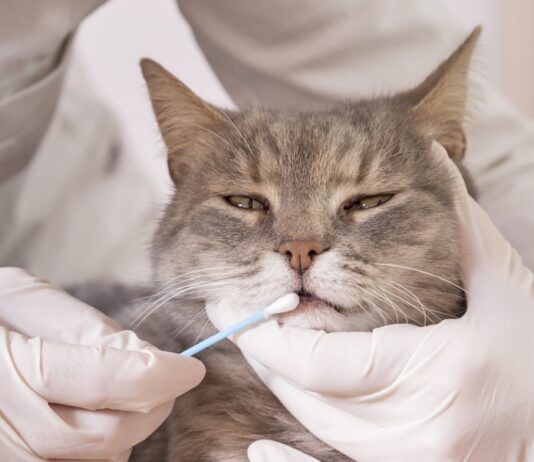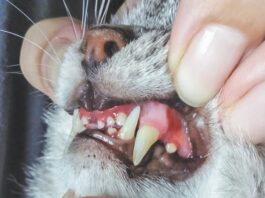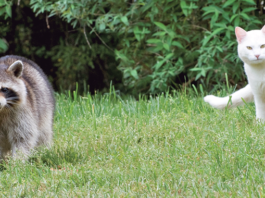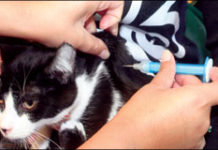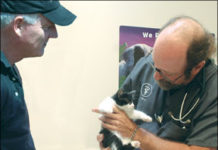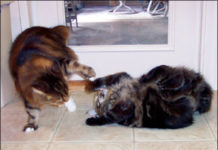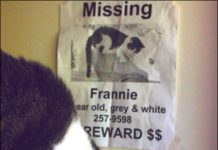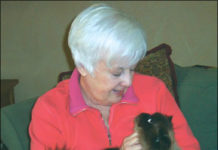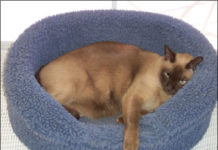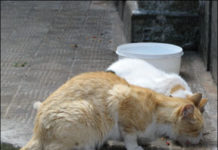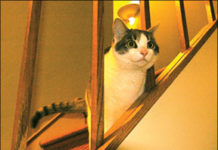Short Takes: 02/09
Here at ShortTakes office, we are on a healthcare honeymoon with Frannie, the feline "office manager" who is barely three years old. We are saving our worries (and money) for feline old age (the last ShortTakes muse, Gertie, lived to 21) when maladies like feline lower urinary tract disease (FLUTD) are likely to strike. Just in time to start to worry comes this report in Veterinary Clinics of North America (Vol. 39 Issue 1): "Changing Paradigms of Idiopathic Feline Cystitis." Cystitis is inflammation of the urinary bladder. Idiopathic means its cause is currently unknown. However, the stressors for cystitis have been identified. The report mentions "stressful events such as earthquakes, seasonal weather changes, moves to a new home, major holidays and diet changes." That settles it, Frannie. You cant move to California during the Santa Anna winds. Or Easter-Passover holidays, either.
Short Takes: 01/09
When veterinarians ask, "How are things at home?" they probably dont want to hear about your mortgage, your migraines or Aunt Millie in the guestroom. They should be asking about "lifestyle" issues that might be affecting the health of your cat. Problem is, too few vets do, according to a report in the Journal of the American Veterinary Medical Association (JAVMA Vol. 233, No. 10) about client-veterinarian communications. The study compared verbal interactions during well-pet visits - the once-a-year checkups (or twice-yearly visits for older cats) as opposed to vet appointments when a medical problem prompted a visit. Typically, as it turns out, well-pet visits include more verbal interaction with the pets, according to the report: Wellness appointments included "twice as much verbal interaction with the pet as did problem appointments, and the emotional atmosphere of wellness appointments was generally relaxed. There were more social talk, laughter, statements of reassurance and compliments directed toward the client and the pet." In contrast, during problem visits, 90 percent of the talk focused on what the report called "biomedical topics." And that is a problem, the JAVMA report concluded, because "veterinarians may neglect lifestyle and social concerns that could impact patient management and outcomes" when focusing on biomedical issues.
Short Takes: 12/08
What a year it was for pet food recalls. Who would have thought, in January 2008, that by years end more than 100 brands of dry cat food and dog food from just one plant in Pennsylvania would be recalled - not for making pets sick, but for a possible link to human cases of infection with Salmonella enterica? So how can the average cat owner make sure not to miss an important food recall? One way is to periodically check the "Recalls & Safety Alerts" section of the U.S. Food and Drug Administrations Web site: www.fda.gov. While youre there, sign up for Email updates. Theres no telling what 2009 will bring.
Short Takes: 11/08
A recent report in the Journal of the American Veterinary Medical Association provided encouraging reassurance that lessons were learned from the tragic melamine contamination of pet food in 2007. Several of the investigators in the study "Clinicopathologic, histologic, and toxicologic findings in 70 cats inadvertently exposed to pet food contaminated with melamine and cyanuric acid" (JAVMA Vol. 233, No. 5) were from Cornell, where the New York State Animal Health Diagnostic Center did some of the groundwork that led to the largest recall of cat and dog food in U.S. history. The 70 cats in this study were not privately owned, nor were they laboratory cats that were deliberately fed suspect food to see if theyd get sick. Rather, they were 70 animals (from a licensed commercial cattery) that happened to be engaged in scientific diet-preference studies when the melamine contamination problem hit the national news. It was their good luck, however, to be where expert veterinary medical care was immediately at hand.
Short Takes: 10/08
In a recent issue of the Journal of the American Veterinary Medical Association (JAVMA Vol. 233, Number 4), the article, "Evaluation of inciting causes, alternative targets and risk factors associated with redirected aggression in cats," describes a typical case of redirected aggression like this: Your indoor cat is watching through the window. Along comes a neighborhood cat, which makes your cat really mad. Suddenly, your normally sweet pet attacks you instead. Redirected aggression is one of the most commonly reported problems to animal-behavior experts, who take the problem seriously: "Bites from aggressors are uninhibited, attacks are usually difficult to stop, and aggressors typically remain highly aroused long after the inciting event is over," according to the JAVMA report. Sometimes all it takes is a loud noise to trigger an episode of redirected (also called displaced) aggression. (For more information on cat fights, please see related article on page 3 of this issue.)
Short Takes: 09/08
While the world holds its breath to see if the highly pathogenic avian flu virus H5N1 mutates enough to spread from person to person, German scientists wondered if the average house cat could have a role. An article in the Journal of Feline Medicine and Surgery (Vol. 10 Issue 4: "Prevalence of influenza H5N1 virus in cats from areas with occurrence of highly pathogenic avian influenza in birds"), gave the results of surveys that covered 171 cats in Austria and Germany. The study was presented "to learn more about the role of cats in the spread of the virus and about the risk posed to cats." They were looking for a good "sentinel" animal among mammals, to give an early warning - the way caged canaries in coal mines used to warn of poisonous gases.
Short Takes: 08/08
With 28.7 percent of all adult American cats classified as "overweight" and 6.4 percent as clinically obese, things only get worse with age. Among cats between five and 11 years of age, fully 44 percent are either overweight or obese. Just in time (we were about to have Frannie, the ShortTakes office kitty, fitted for running shoes) comes this report in the Journal of the American Veterinary Medical Association (Vol. 232, No. 11): "Nutraceuticals and dietary supplementation for the management of obese and overweight pets." The study looked at everything from omega-3 fatty acid supplementation, amylase inhibitors and DHEA (dehydroepiandrosterone) to L-carnitine, CLA (conjugated linoleic acid) and dietary phytoestrogens. Some, such as diacylglycerol, make a computers spell-checker burp. And not all, including the last one, have been tested on cats.
Short Takes: 07/08
Theres more finger-pointing toward pets as "reservoirs" of MRSA, the hard-to stop bacterium methicillin-resistant Staphylococcus aureus. This time the New England Journal of Medicine (Vol. 358, No. 11) reports on a German woman who suffered deep abscesses and necrotizing pneumonia. The womans cat seemed healthy enough - until tests found the pet infected with a form of MRSA that is extremely rare in humans, spa-type t131 MRSA. Doctors at the Bavarian Food and Health Safety Authority said: "The abscesses in our patient healed only after antibiotic treatment of the cat. It remains unclear whether the cat was the source of the patients infection or vice versa . . . We conclude that pets could be considered as possible household reservoirs of MRSA that can cause infection or reinfection in humans."
Short Takes: 06/08
Despite protests by the Cat Fanciers Association (and the American Kennel Club), Los Angeles has enacted one of the strictest pet-sterilization laws in the country. Unless youre a registered breeder, failure to spay or neuter a cat after four months of age in L.A. can bring a $500 fine or 40 hours of community service. Advocates of the tough new law say they had no choice. Los Angeles animal shelters had to euthanize 8,960 unwanted cats last year.
Short Takes: 05/08
Studies reported in the Journal of the American Veterinary Medical Association (Vol. 232, No. 6) suggest that the human anti-epileptic drug, levetiracetam, "is well tolerated in cats and may be used as an adjunct to phenobarbital treatment in cats with idiopathic epilepsy." "Idiopathic" means that the root cause of the epilepsy is not known. And researchers acknowledge that no one knows exactly how levetiracetam works - just that it is not harmful to a cats liver or kidneys.
Short Takes: 04/08
Its one of the toughest choices a pet owner can face - between life-saving treatment and quality of life for the pet. During chemotherapy for lymphoma, the third most common form of cancer in cats, for example, the patient might lose hair, appetite, weight, sleep or even its whiskers. Some help in deciding, if the difficult time ever comes, can be found in a Journal of Feline Medicine and Surgery (Vol. 10, Issue 1) report: "Owners perception of their cats quality of life during chemotherapy for lymphoma." Of the 31 cat owners queried for the study, 25 (81 percent) said they were happy that they had treated their cat with chemotherapy, whereas three felt regretful and three were unsure of their feelings. Most of the owners (19) reported that their cats had "more good days than bad" during chemo; seven reported more bad days than good (including one cat that was miserable every day of the treatment); and four cats had "all good days." Despite the treatment, some cats did die of lymphoma or related causes. Obviously those owners were not happy with their pets eventual fate, but few regretted trying their best to save a life.
Short Takes: 03/08
If statistics help you make difficult decisions, there are plenty of numbers in a Journal of the American Veterinary Medical Association (Vol. 231, No. 1) article, "Determining the optimal age for gonadectomy of dogs and cats." First the researchers compared benefits and risks of the surgeries. For example, spayed female cats incur an immediate 2.6 percent risk of surgical complications, [IMGCAP(1)]as well as a high risk of obesity, and less than a one percent risk of either FLUTD (feline lower urinary tract disease) or diabetes mellitus - all later in life. None of spayings possible outcomes causes what the researchers termed "substantial morbidity." That is, surgical complications from the spaying (called ovariohysterectomy or OHE) are hardly ever life-threatening.

